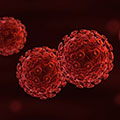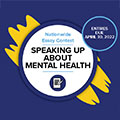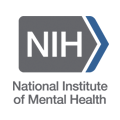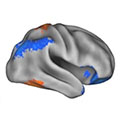Science News About Prevention of Mental Disorders
- Decades of Dedication and Collaboration: Unraveling the HIV Mystery
-
• 75th Anniversary
In celebration of NIMHs 75th anniversary, we reflect on decades of work by the institute to understand and eradicate HIV.
- Saving Lives Through the Science of Suicide Prevention
-
• 75th Anniversary
Evidence-based efforts to improve suicide risk screening, assessment, and intervention are helping to save lives, thanks to research supported by NIMH.
- Chatbot Encourages People With Eating Disorders to Seek Care
-
In a new NIMH-funded study, Ellen Fitzsimmons-Craft, Ph.D., an associate professor of psychiatry at Washington University School of Medicine, and colleagues developed a chatbot to encourage people with eating disorders to connect with care.
- Media Advisory: NIH’s Climate and Health Initiative Tackles Global Health Effects Associated With a Climate change
-
A coalition of leaders at NIH outline how the NIH Climate Change and Health Initiative is uniquely poised to lead and engage with communities and agencies globally to address the health effects associated with climate change.
- Family-Based Intervention Lowers Long-Term Suicide Risk in Youth
-
In a recent study supported by the National Institute of Mental Health, researchers examined the impact of a family-based intervention on suicide risk in youth and found risk-reduction benefits up to 10 years later.
- Low Motivation for Social Bonding May Signal Behavior Problems in Early Childhood
-
In an NIMH-supported study, researchers found that low social affiliation—low motivation for social engagement and bonding—may be a precursor that identifies children as early as age 2 who are likely to develop callous-unemotional behaviors.
- Adult “Picky Eaters” Recall Helpful Parent Feeding Strategies
-
Researchers asked a group of self-identified adult “picky eaters” to reflect on their parents’ feeding strategies to better understand which strategies were helpful and which weren’t.
- National Contest Encourages High School Students to Write Short Essays Exploring Mental Health
-
The National Institutes of Health invites students ages 16 to 18 years old to participate in the “2022 Speaking Up About Mental Health!” essay contest.
- Clinical Decision Support System Reduces Cardiovascular Risk in Patients With Serious Mental Illness
-
A new study shows the use of a clinical decision support system to prompt the use of shared decision-making tools, such as handouts, may result in positive impacts on long-term cardiovascular health in patients with serious mental illness.
- Understanding the Characteristics of Suicide in Young Children
-
Researchers supported by NIMH recently published a study describing the characteristics of suicide in young children and the factors that sometimes precede these tragic events, providing an avenue for future research and intervention.
- Researchers Use Exosome-Based Strategy to Block HIV in Mice
-
In this NIMH-funded study, researchers used exosomes to deliver novel protein into the cells of mice infected with HIV. The protein attached to HIV’s genetic material and prevented it from replicating, resulting in reduced levels of HIV in the bone marrow, spleen, and brain.
- Eating Disorder Behaviors Alter Reward Response in the Brain
-
A new NIMH-supported study found that eating disorder behaviors alter the brain’s reward response process and food intake control circuitry, which can reinforce the behaviors.
- Assessing Suicide Risk Among Childbearing Women in the U.S. Before and After Giving Birth
-
NIMH-supported researchers investigated suicide risk among women in the year before and year after giving birth.
- Investigating Unintentional Injury as a Risk Factor for Self-Harm
-
In a recent study, NIMH-supported researchers found that certain types of unintentional injury have stronger associations with self-harm than others in adolescents.
- NIMH Addresses Critical Need for Rapid-Acting Interventions for Severe Suicide Risk
-
NIMH is working to meet the urgent need for rapid-acting suicide prevention interventions by supporting research investigating the feasibility and safety of treatment protocols that have the potential to quickly reduce severe suicide risk in youth and adults.
- Study Identifies Risk Factors for Elevated Anxiety in Young Adults During COVID-19 Pandemic
-
A new study has identified early risk factors that predicted heightened anxiety in young adults during the coronavirus pandemic.
- Testing and Refining Biomarkers to Support Intervention Research for Children with Autism
-
NIMH, along with other NIH Institutes, is supporting the ABC-CT project, a multisite study that aims to test and refine biomarkers that can be used as objective measures of social impairment for children with autism in clinical trials, leading to more predictive and personalized treatment.
- NIMH Awards Funding for Research on Preventing Firearm Injury and Mortality
-
Suicide attempts by firearm are especially dangerous, with as many as 9 out of 10 attempts resulting in death. NIMH is supporting three projects focused on preventing and reducing firearm injury and mortality to help address the critical need for more research in this area.
- Brief Suicide Prevention Interventions in Acute Care Settings May Reduce Subsequent Suicide Attempts
-
A research project supported by NIMH analyzed multiple studies to determine the effectiveness of brief suicide prevention interventions in acute care settings.
- NIMH Part of Collaborative Effort to Advance Early Intervention for Individuals at Risk of Developing Schizophrenia
-
NIMH has joined with other NIH Institutes in launching an new Accelerating Medicines Partnership focused on advancing the development of better ways to identify and treat those at clinical high risk for psychosis.
- Differences in Suicide Risk Among Subgroups of Sexual and Gender Minority College Students
-
In an NIMH-supported study, researchers found that college students identifying as a sexual or gender minority had higher rates of suicidal risk factors than cisgender and heterosexual peers, and that there were significant differences in risk among sexual minority subgroups.
- Media Advisory: NIMH Researchers Available to Discuss Suicide Prevention
-
Experts from the National Institute of Mental Health are available to speak on topics related to suicide and suicide prevention, including the warning signs of suicide, suicide prevention methods, trends in suicide rates, how to find mental health help and support, and the latest in suicide prevention research.
- NIMH Leadership Describes Suicide Prevention Research Priorities
-
In a new paper, published in JAMA Psychiatry, NIMH looks forward, outlining the next stages in the Institute’s suicide prevention research priorities.
- Supporting the Development of Early Autism Screening Tools
-
NIMH, along with other NIH Institutes, is supporting the goal of identifying autism in the first year of life by funding projects that seek to seek to translate findings related to early-emerging signs of autism into practical ASD screening tools that can be implemented in the general population and community settings.
- Emergency Drug Overdose Visits Associated with Increased Risk for Later Suicide
-
A new data analysis has found patients who visited the emergency department for an opioid or sedative/hypnotic drug overdose were at higher risk of dying by drug overdose or suicide in the year after being discharged relative to the general population.
- Identifying Practices for Reducing Incarceration of Those with Mental Illnesses—A Study of “Stepping Up”
-
According to a 2017 report by the Bureau of Justice Statistics, approximately two-thirds of female inmates in prisons and jails and around a third of men in prisons and jails report having been diagnosed as having mental health disorder by a mental health professional.
- Using Technology to Help Predict Binge and Purge Episodes in People with Eating Disorders
-
In binge-eating disorder and bulimia nervosa, people experience recurrent and frequent episodes in which they eat unusually large amounts of food and feel a sense of loss of control.
- NIH Announces Winners of High School Mental Health Essay Contest
-
NIH announces 10 winners of the “Speaking Up About Mental Health! This Is My Story” national essay challenge, aimed at spurring conversations among youth about mental health and encouraging them to seek support for themselves and others.
- Novel Method Identifies Patients at Risk for HIV Who May Benefit From Prevention Strategies
-
Researchers have demonstrated the effectiveness of using algorithms that analyze electronic health records (EHRs) to help physicians identify patients at risk for HIV who may benefit from preexposure prophylaxis (PrEP), which significantly reduces the risk of getting HIV.
- NIH Study Shows Many Preteens Screen Positive for Suicide Risk During ER Visits
-
A research team found nearly one-third of youth ages 10 to 12 years screened positive for suicide risk in emergency department settings, including those seeking help for physical concerns only.
- New Pathways for Implementing Universal Suicide Risk Screening in Healthcare Settings
-
A new report provides guidance on how to implement universal suicide risk screening of youth in medical settings. The report describes a way for hospitals to address the rising suicide rate in a way that is flexible and mindful of limited resources.
- Inflammation in Pregnant Moms Linked to Child’s Brain Development
-
High levels of maternal inflammation during pregnancy have been linked to effects in children, including reduced brain circuit communications and altered long-distance brain wiring at birth, poorer cognitive function at one year – and to reduced impulse control and working memory at two years.
- New Toolkit Offers Ways to Evaluate Suicide Prevention Efforts in Arctic Communities
-
The National Institute of Mental Health (NIMH), in collaboration with the Mental Health Innovation Network and other federal partners, has released the RISING SUN toolkit to help clinicians, communities, policymakers, and researchers measure the impact and effectiveness of suicide prevention efforts in rural and tribal communities.
- Predicting Suicide Attempts and Suicide Deaths Using Electronic Health Records
-
Researchers have developed a new prediction model that substantially outperforms existing self-report tools used to predict an individual’s risk of a suicide attempt or dying by suicide.
- Targeted E-Health HIV Intervention Reduces STIs and Sexual Risk Behaviors
-
Findings from a new study suggest an electronically delivered HIV prevention intervention may be effective in reducing sexually transmitted infections (STIs) and sexual risk behaviors in young men who have sex with men.
- Embracing the SPIRIT of reducing suicide
-
NIMH, NIH, and the National Institute of Justice are collaborating on a 4-year, $6.8 million study called Suicide Prevention for at-Risk Individuals in Transition or “SPIRIT.” The study focuses on the high-risk individuals who are transitioning from jail to community. SPIRIT is NIMH’s first major investment in suicide prevention in the justice system.
- Personalized Screen to ID Suicidal Teens in 14 ERs
-
A new study will develop and test a personalized, computer-based suicide risk screening tool to help ERs identify troubled teenagers.
- Healthy People 2020 Webinar
-
Healthy People 2020 Webinar: Substance Use and Mental Disorders: Early Detection, Prevention, and Treatment



































